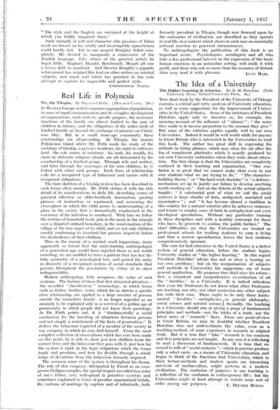Real Life in Polynesia
We, the Tikopia. By Raymond Firth. (Allen and Unwin. 30s.)
Is Western Europe, with its immense aggregations of population, its ease of rapid communication and its complex development of organisations, each with its specific purpose, the necessary functions of the family are almost limited to the care of children in infancy, and the obligations of the wider circle of kindred hardly go beyond the exchange of presents on Christ- mas Day. But in a small stone-age community these relationships are all-pervading. In Tikopia, the remote Polynesian island where Dr. Firth made his study of the sociology of kinship, a person's residence, his right to cultivate land- --the sole source of existence—his rank, his wealth, his share in elaborate religious rituals, are all determined by his membership of a kindred group. Through wife and mother, and later through the marriages of his own children, he is linked with other such groups. Each form of relationship calls for a recognised type of behaviour and carries with it recognised obligations.
The bare skeleton of a kinship•sy-stem has been described in such terms often enough. Dr. Firth clothes it with the rich detail of its manifestations in daily life, describing scenes of parental affection or elder-brotherly domination, quoting phrases of instruction or reprimand, and recreating the atmosphere in which the child grows to understanding of a place in the society that is dramatically emphasised at the ceremony of his initiation to manhood. With him we follow the routine of household work, join in the meal, in the wrangle over a disputed orchard boundary, in the consternation of the village at the rare anger of its chief, and see not only children meekly conforming to standard but parents impotent before the disobedience of their children.
Thus in the mosaic of a myriad small happenings, many apparently so trivial t hat the curio-hunting anthropologist of a generation ago would have rejected them as not worth recording, we arc enabled to trace a pattern that has lost the false symmetry of a genealogical tree, and gained the unity in diversity of a recognised system of social standards that persists throughout the generations by virtue of its sheer indispensability.
Modern anthropology fully recognises the value ,of such systems. The feature of them that first attracted attention— the so-called " classificatory " terminology, in which terms such as father, brother, sister, which for us denote a specific close relationship, are applied to a large number of persons (outside the immediate family—is no longer regarded as an anomaly to be explained only as a survival of a golden age of promiscuity in which people did not know their parentage. As Dr. Firth points out, it is " fundamentally a social mechanism for the handling of situations between persons
and not simply a restatement of the facts of procreation." It defines the behaviour expected of a member of the society in
any company in which he may find himself. From the most complete collection of observations which has ever been made on this point, he is able to show just how children learn the correct term and the behaviour that goes with it, just how far the system is rigid, in the legal obligations which the terms imply and proclaim, and how far flexible through a whole range of deviations from the behaviour formally required.
The common sense of the system is throughout his theme. The rule of clan exogamy, interpreted by Freud as an over- grown Oedipus-complex, the special respect accorded to a sister of ones father, very widespread in primitive societies and sometimes explained in terms of peculiar supernatural beliefs, the customs of marriage by capture and of infanticide, both formerly prevalent in Tikopia though now frowned upon by the emissaries of civilisation, are described as they operate in real life, in a context which shows in each case an essentially rational reaction to practical circumstances.
To anthropologists the publication of this book is an important event. Psychologists, sociologists and all who take a less professional interest in the expression of the basic human emotions in an unfamiliar setting, will study it with profit, and those who ask no more than the of distant
skies may read it with pleasure. Lucy MAIR.






































 Previous page
Previous page